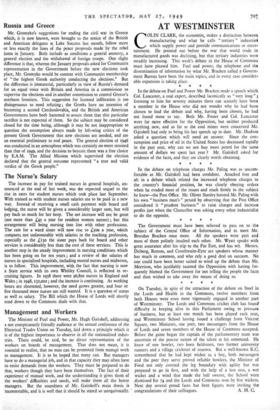AT WESTMINSTER
COLIN CLARK, the economist, makes a distinction between manufacturing and what he calls " tertiary " industric$ which supply power and provide communications or enter- tainment. He pointed out before the war that world trade in manufactured goods was declining, but that tertiary industries were steadily increasing. This week's debate in the House of Commons must have pleased him. Fuel and power, the telephone and the dissemination of information by what Mr. Bracken called a Govern- ment Bureau have been the main topics, and in every case consider■ able expansion is taking place. * * * ir In the debate on Fuel and Power Mr. Bracken made a speech which. Col. Lancaster, a coal expert, described laconically as "very long " ; listening to him for seventy minutes there can scarcely have been a member in the House who did not wonder why he had been chosen to lead the debate and why, having been chosen, he had not found more to say. Both Mr. Foster and Col. Lancaster were far more effective for the Opposition, but neither produced anything new, and as far as the coal mines were concerned Mr. Gaitskell had only to bring his last speech up to date. Mr. Hudson asked a question which will need an answer. Since the con- sumption and price of oil in the United States has decreased rapidly in the past year, why can we not buy more petrol for the same amount of dollars we spent last year ? Mr. Gaitskell asked for evidence of the facts, and they are clearly worth obtaining.
* * * * In the debate on telephone charges Mr. Paling was as uncom- fortable as Mr. Gaitskell had been confident. Attacked fore and aft in a debate which related the increased telephone charges to the country's financial position, he was clearly obeying orders when he evaded most of the issues and stuck firmly to the subject he knew—the Post Office. Mr. Oliver Stanley hoisted Mr. Paling with his own " business man's " petard by observing that the Post Office considered it " prudent business " to raise charges and increase profits just when the Chancellor was asking every other industrialist to do the opposite. * * *
The Government must have been relieved to pass on to the subject of the Central Office of Information, and to meet Mr. Brendan Bracken once more. All the speakers were pert and most of them politely insulted each other. Mr. Wyatt speaks with great assurance after his trip to the Far East, and has wit. Messrs. Driberg, Renton, and Crosthwaite-Eyre are speakers whose manner has much in common, and who rely a good deal on sarcasm. No one could have been better suited to wind up the debate than Mr. Morrison, who justifiably taunted the Opposition with having fre- quently blamed the Government for not telling the people the facts and then wished to take away the means of doing so.
* * * * On Tuesday, in spite of the attraction of the debate on Steel in the Lords and Health in the Commons, twelve members from both Houses were even more vigorously engaged in another part of Westminster. The Lords and Commons cricket club has found' difficulty in keeping alive in this Parliament owing to pressure of business, but at least one match has been played each year, and Westminster School having issued a challenge from Vincent Square, two Ministers, one peer, two messengers from the House of Lords and seven members of the House of Commons accepted. Before the gime began the captain of the parliamentary team was uncertain of the precise nature of the talent at his command. He knew of one bowler, two keen fieldsmen, two former university runners and a village cricketer of renown. But a well-known K.C. remembered that he had kept wicket as a boy, both messengers and the peer they serve proved reliable bowlers, the Minister of Food not only covered the leg boundary with agility but was prepared to go in first, and with the help of a lost toss, a wet wicket and a wind that made the ball swerve, the School were dismissed for 74 and the Lords and Commons won by five wickets. Next day several proud faces but bent figures were inviting the
• congratulations of their colleagues. A. M. C.






































 Previous page
Previous page